Ready to learn more?
Get all the details straight to your inbox!
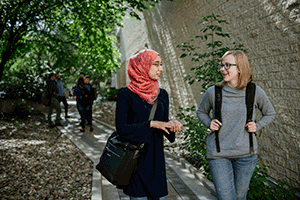
You can book a tour of Luther College, the U of R campus, and our student residence, The Student Village at Luther College, any time throughout the year. Contact our Recruitment Office at 1-306-206-2117.

Smaller class sizes at Luther College means more individualized attention and better connections with your professors, classmates, and academic advisors.

To enrol as a Luther College student, simply fill out the University of Regina application form and select Luther as your campus of choice.

Wondering where to live? Our student residence, The Student Village at Luther College, is considered a great choice for first-year student accommodation. Individual private rooms mean you can stick to your own schedule and you never have to deal with roommate hassles.
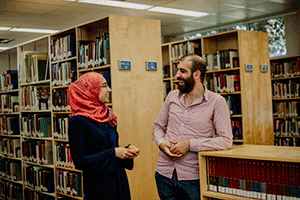
The Luther Library has over 24,000 items in its collection, 5,000 books checked out per year, and 7,000 students who come through its door per month.
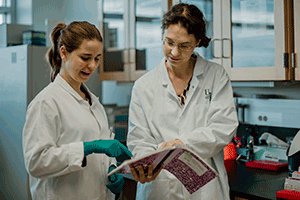
Luther College offers Bundles programs that group together first-year students and classes to give you a great start and help ease the transition from high school to university.
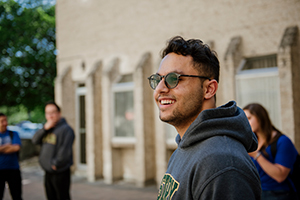
Every degree program at Luther College offers a study abroad option and an optional experiential learning component where you gain real world experience and get paid while going to school!
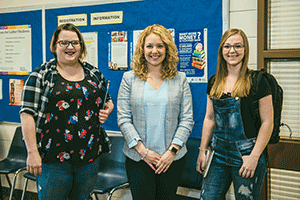
The priority deadline for academic application is March 15. To book a personalized enrolment counselling appointment, contact our Recruitment Office at 1-306-206-2117.
Get all the details straight to your inbox!
By Bryan Hillis (Religious Studies)
 It’s always interesting to me that while we are known as “professors of knowledge”, and in that we can only profess to know and teach our little corner of the vast universe of knowledge, even in our particular area, what our students quickly know us best for is our teaching ability. Yet for me, that ability to be a teacher comes in great part from our learning on the job, and that learning comes so much from our students and the feedback they give us. It comes in the form of the traditional evaluative procedures like exams and papers or our teaching evaluations which we have used at Luther College for over 20 years. But it also comes from the conversations, the body language used during a lecture or seminar and the times when we see their eyes light up and realize we have truly turned someone on: either to that discipline, to a new idea, or simply to an insight.
It’s always interesting to me that while we are known as “professors of knowledge”, and in that we can only profess to know and teach our little corner of the vast universe of knowledge, even in our particular area, what our students quickly know us best for is our teaching ability. Yet for me, that ability to be a teacher comes in great part from our learning on the job, and that learning comes so much from our students and the feedback they give us. It comes in the form of the traditional evaluative procedures like exams and papers or our teaching evaluations which we have used at Luther College for over 20 years. But it also comes from the conversations, the body language used during a lecture or seminar and the times when we see their eyes light up and realize we have truly turned someone on: either to that discipline, to a new idea, or simply to an insight.
The single most important aspect of teaching I have learned from my students is that content is secondary to learning. Allow me to give an example to illustrate what I mean. As a freshly minted Ph.D. I was so anxious to share all that I knew and was continuing to learn in my discipline, the history of Christian theology. Of course, it was totally unreasonable to expect that undergraduates could soak up all those facts and ideas, but more to the point is that I learned from my students that the knowledge of the era, the people, the discipline, etc. was important. Far more important was being able to learn the lessons from that discipline.
As someone who taught a lot of historical Christian theology early in my career, I remember being challenged by a more mature student at Memorial University in Newfoundland asking simply “so what?” in response to an incredibly learned 60’ diatribe I had just given on the grammatical differences that the two sides of the Nicene creed debate debated way back in 325 AD. Once I got over the impertinence of the question, I realized just how critical her question was. And when I went back to my apartment in St. John’s that night, I realized that my point was really about what the Creed meant today or didn’t mean to people when they said it in church. Going back the next day with a folder full of notes, I remember starting off the class time with the infamous “so what?” question, and, with some great fear and trepidation, turning it over to the students. While we did not get through my folder full of notes, I have no doubt that the class had more fun, learned more about the critical incident of 325 AD and certainly way more about the way belief systems are formulated, or not, and how it can change, or not, over centuries of interpretation.
From that incident in Newfoundland in 1988, and many more since then, I have learned from students the importance of ensuring that the “knowledge” is internalized. As a colleague, Dr. Nick Terpstra, once said at a convocation address, that internalization of knowledge is what we know as wisdom. It doesn’t come from the teacher, least of all me! But it does come from the students engaging the subject as they can only do when they get past learning the facts, and, as Martin Luther says in his catechism, asking “what does this mean?”
I said I have learned a great deal from students; I have, as indicated above, also learned a great deal from colleagues. Dr. Paul Antrobus, good friend and beloved professor of psychology at Luther College for over thirty years, constantly reminded me that students can only learn material that connects with their experience. For that we need to get to know the students, and we need to build on what they already have as knowledge. That is so hard to do, but it is also why Paul was so well loved as a professor; he always knew his students well enough to connect with them.
I have also learned a great deal from team teaching with Luther College colleagues. From Dr. Mary Vetter I learned that the use of PowerPoint as a textual resource is a waste of time, but PowerPoint as a way of cementing images in a student’s mind, combined with searching questions and discussion, is a very useful pedagogical tool. From Dr. Volker Greifenhagen I have learned how one has to ask the same critical questions of our own culture as we like to ask of other cultures, even if the answers to those questions are every bit as disturbing as they are for the unfamiliar culture. From Dr. Brenda Anderson I have learned that every student’s opinion matters and needs to be recognized, even if sometimes I can see her choking on that opinion or wondering how it could ever occur in her class. And from Dr. Roger Petry I have learned about the passion one can have for a discipline or a perspective, even while recognizing that further research may prove that perspective in need of revision. I am sure I would have learned much more from other colleagues, had I had the chance to teach with them. But I will say that the team teaching I have enjoyed with these colleagues has been among the most enriching teaching experiences of my career.